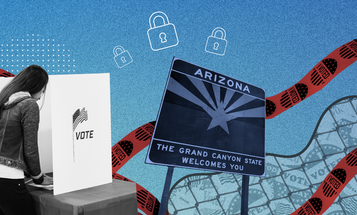
STATEMENT: Maryland Enacts Law to Count Incarcerated People at Their Home Addresses
Law, First of Its Kind, Will Improve Fairness and Accuracy of the Census Data Used for Redistricting
Annapolis, MD — Today, Governor Martin O’Malley signed into law a bill ensuring that incarcerated persons will be counted as residents of their home addresses when new state and local legislative districts are drawn in Maryland.
The U.S. Census counts incarcerated people as residents of the prison location. When state and local government bodies use Census counts to draw legislative districts, they unintentionally enhance the weight of a vote cast in districts that contain prisons at the expense of all other districts in the state. Maryland is the first state to pledge to collect the home addresses of incarcerated people and correct the data state-wide.
The new law will help Maryland correct past distortions in representation caused by counting incarcerated persons as residents of prisons, such as the following:
- 18% of the population currently credited to House of Delegates District 2B (near Hagerstown) is actually incarcerated people from other parts of the state. In effect, by using uncorrected Census data to draw legislative districts, the legislature granted every group of 82 residents in this districts as much political influence as 100 residents of every other district.
- In Somerset County, a large prison is 64% of the 1st Commission District, giving each resident in that district 2.7 times as much influence as residents in other districts. Even more troubling is that by including the prison population as “residents” in county districts, the county has been unable to draw an effective majority-African American district and has had no African-American elected to county government, despite settlement of a vote dilution lawsuit in the 1980s.
The problem is national as well. One legislative district in New York includes 7% prisoners; a legislative district in Texas includes 12% prisoners; and 15% of one Montana district are prisoners imported from other parts of the state. Indeed, the 2010 Census will find five times as many people in prison as it did just three decades ago. To address this problem, eight other states have similar bills pending in the current session or being prepared for reintroduction in the next legislative session: Connecticut, Florida, Illinois, Minnesota, New York, Oregon, Rhode Island, and Wisconsin.
"The Maryland legislature has taken a much-needed step to ensure fairness in redistricting and reflect incarcerated populations in a more accurate way. Maryland's action should pave the way for other states to end the distortions caused by counting incarcerated persons in the wrong place,” said Peter Wagner, Executive Director of the Prison Policy Initiative.
"Maryland’s 'No Representation without Population' Act will bring the state's redistricting practices in line with the rules Maryland uses for determining legal residence of incarcerated persons for other purposes. We applaud this common-sense solution to a growing problem of fairness in representation," said Brenda Wright, Director of the Democracy Program at Demos.
The legislation, passed as H.B. 496 and S.B.400, applies only to redistricting and would not affect federal funding distributions.
The Prison Policy Initiative and Demos have a national project to end prison-based gerrymandering, seeking to change how the U.S. Census counts incarcerated people and how states and local governments use prison counts when drawing districts. The two groups provided technical assistance to the American Civil Liberties Union (ACLU) of Maryland and the Legislative Black Caucus of Maryland who led this effort.
In addition, Mr. Wagner and Ms. Wright both testified in support of Maryland’s new law at legislative hearings this spring. Their testimony pointed out that HB496/SB400 has precedent in the practice of more than 100 rural counties around the country that currently revise the Census Bureau’s prison counts for internal districting purposes, and in the laws of states such as Kansas that adjust the Census for other purposes.
PPI and Demos long have advocated for the Census Bureau to change its practices so that incarcerated persons would be counted at their home residences on a nationwide basis. While it is too late for that change to be made for the 2010 Census, the Census Bureau's recent decision to accelerate the release of its prison count data so that states can more readily identify prison populations in the Census will be helpful to states such as Maryland that wish to make their own adjustments.
PPI and Demos applaud the lead sponsors of the legislation, Delegate Joseline Pena-Melnyk and Senator Catherine Pugh, who deserve special credit for their leadership on this issue. Although both represent legislative districts that contain large prison populations currently counted as part of their districts, both recognized that the issue of fairness and accuracy in statewide redistricting should take precedence over individual concerns. PPI and Demos are also encouraged by the bi-partisan support for the bill including that of Republican Senators J. Lowell Stoltzfus and Donald F. Munson.
###



